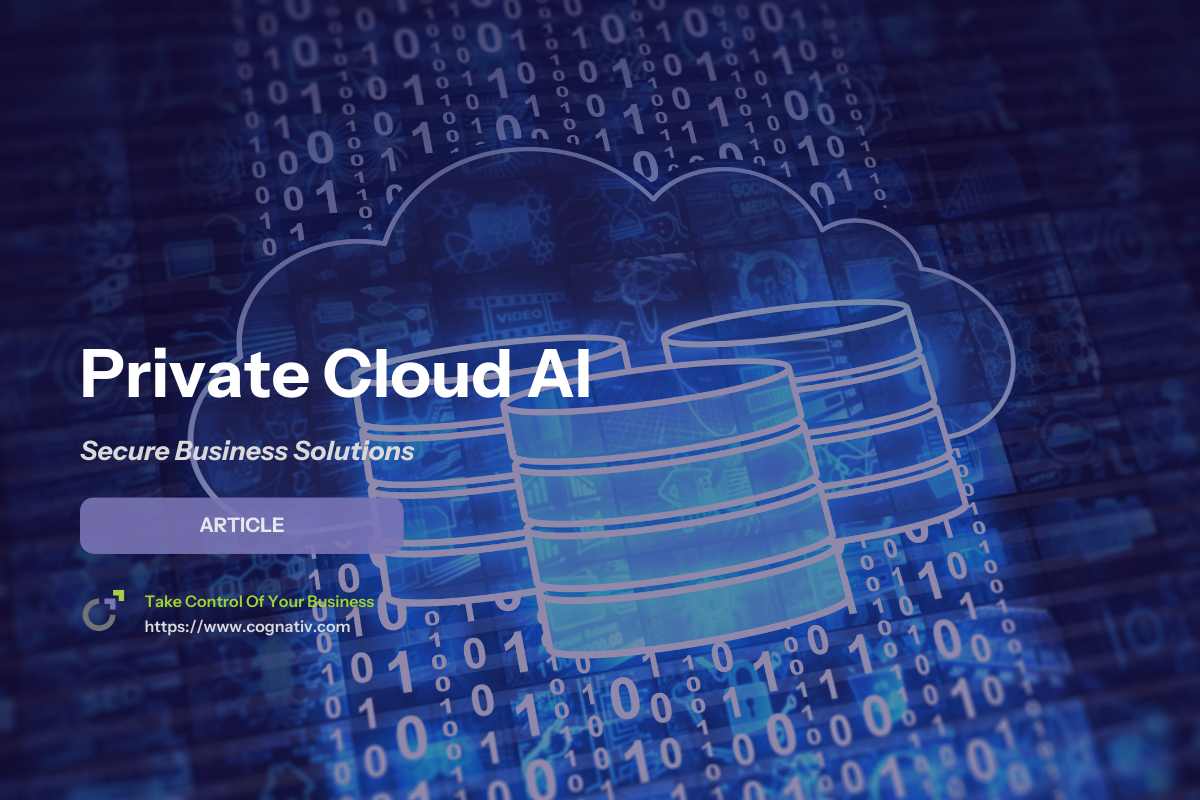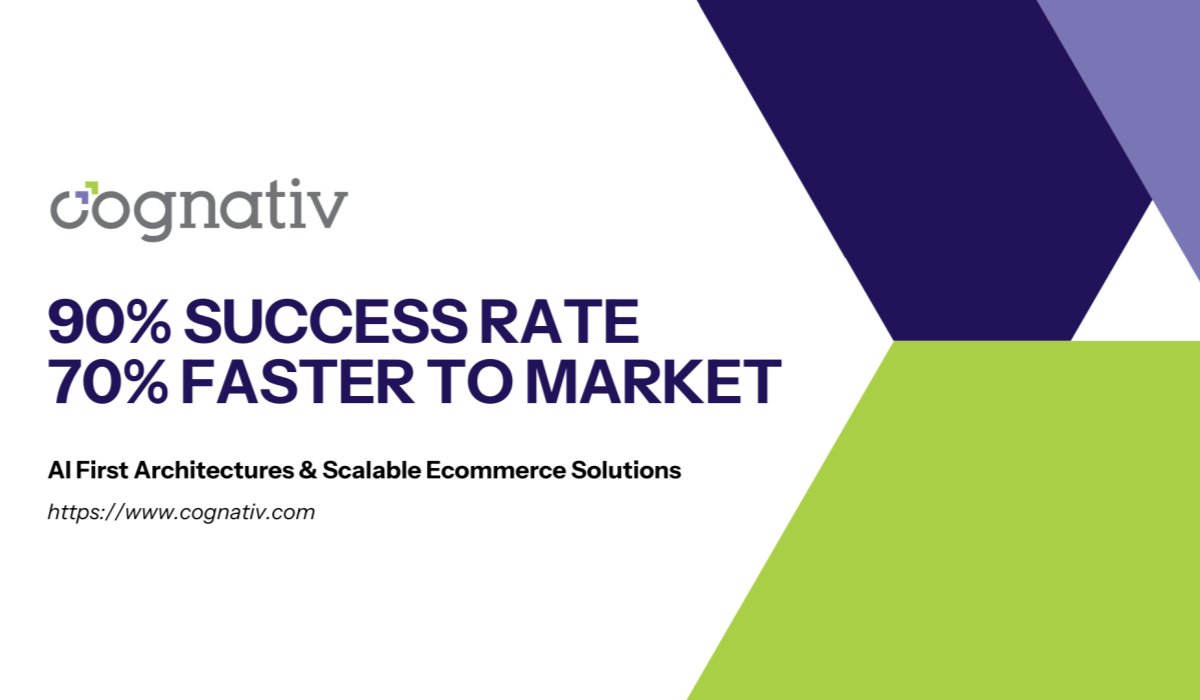Private Cloud AI for Secure Business Solutions
In today’s rapidly evolving digital landscape, businesses are increasingly adopting private cloud AI to drive innovation while maintaining privacy and security. Balancing the benefits of both public and private cloud environments, organizations can optimize their AI initiatives by leveraging existing infrastructure and advanced software defined storage solutions. This approach enables seamless model deployment, efficient management of AI workloads, and enhanced control over sensitive data.
For example, companies can utilize bare metal servers within private clouds to achieve high performance and low latency required for demanding AI applications. By integrating these hardware and software solutions, businesses ensure compliance with regulatory bodies such as the exchange commission while reducing cloud costs. This strategic use of private cloud AI empowers organizations to unlock new capabilities, scale operations securely, and maintain a competitive edge in the AI-driven economy.
Key Takeaways
-
Private cloud AI offers enhanced data security and data privacy by keeping sensitive data and AI models within a controlled environment, reducing risks related to intellectual property and regulatory compliance.
-
Leveraging private cloud infrastructure enables organizations to efficiently manage and scale complex AI workloads, including retrieval augmented generation and predictive maintenance, while maintaining predictable cloud costs and high performance.
-
Integrating private cloud AI with existing infrastructure and services empowers businesses to target specific user needs and strategic AI initiatives, ensuring a flexible, secure, and cost-effective foundation for innovation.
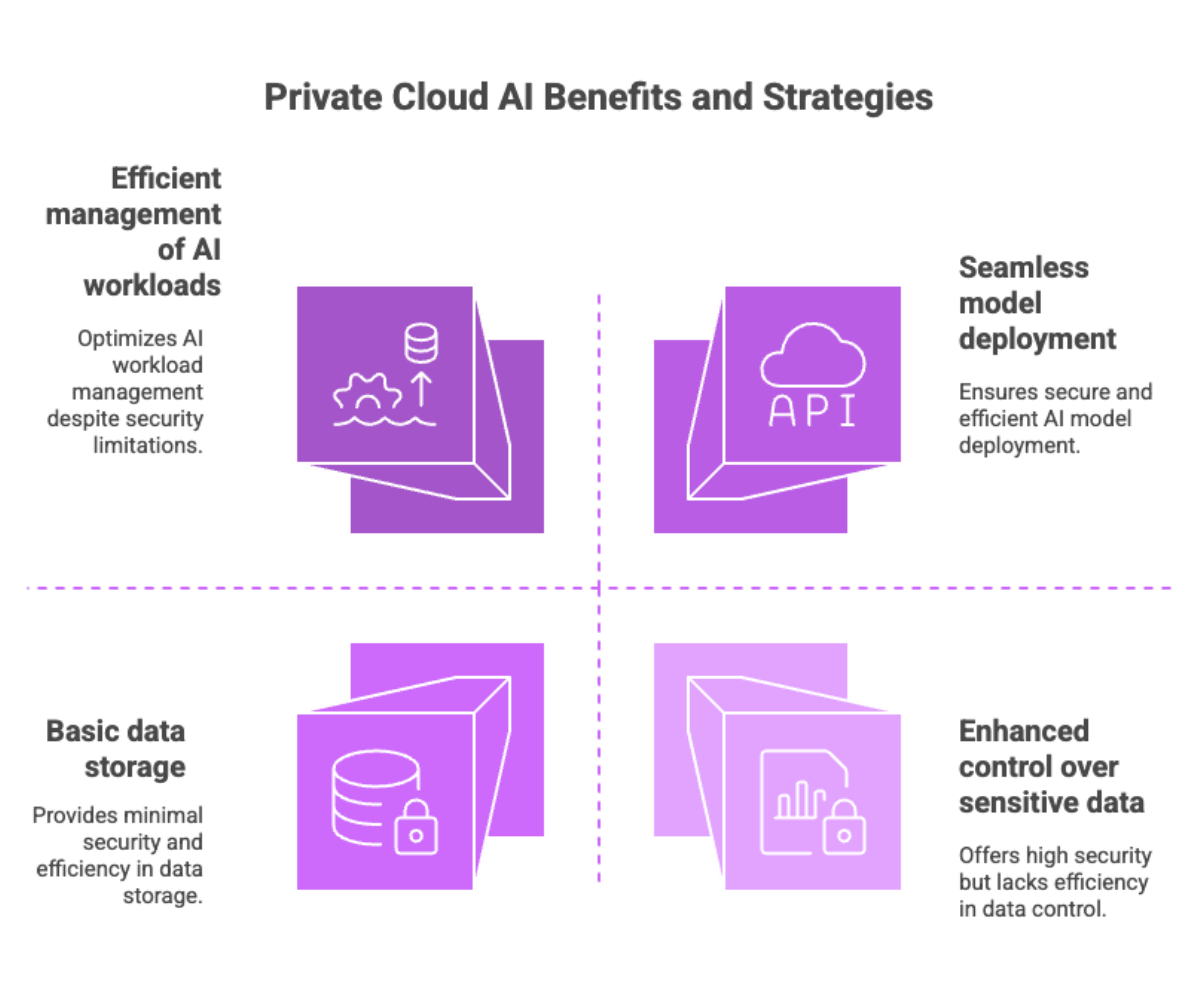

Introduction to Private Cloud
As digital transformation accelerates, businesses are increasingly seeking secure and flexible infrastructure to support next-generation technologies. Private cloud solutions have emerged as a strategic choice, offering a dedicated environment for organizations to leverage AI capabilities while maintaining stringent control over their sensitive data.
Unlike public cloud models, private cloud environments offer:
-
Enhanced data security and governance
-
Greater control over resources and infrastructure
-
Customizable architectures to support complex AI workloads
From machine learning operations to regulatory compliance, private clouds provide the scalability and reliability that enterprises need to fuel innovation without compromising on security.
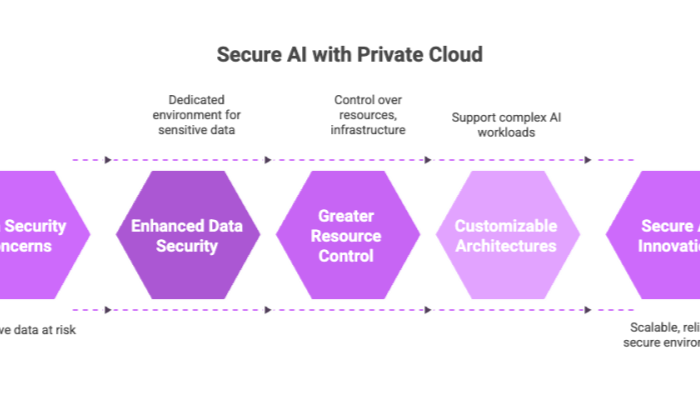

Data Security in Private Cloud
In today’s threat landscape, data security is not optional—it’s a cornerstone of operational integrity. Private cloud solutions address these concerns with advanced security protocols, ensuring data privacy and regulatory adherence.
How private clouds ensure data security?
-
Granular access controls: Limit access based on roles and policies.
-
Encryption at rest and in transit: Protects data from unauthorized access.
-
Audit trails and compliance support: Enables tracking of activities for standards like GDPR, HIPAA, or SOC 2.
-
Isolation of resources: Unlike public clouds, your data and applications aren’t shared across tenants.
Additionally, for AI models, private clouds reduce the risk of IP theft and unauthorized data exposure, making them ideal for industries like healthcare, finance, and defense where trust and control are critical.
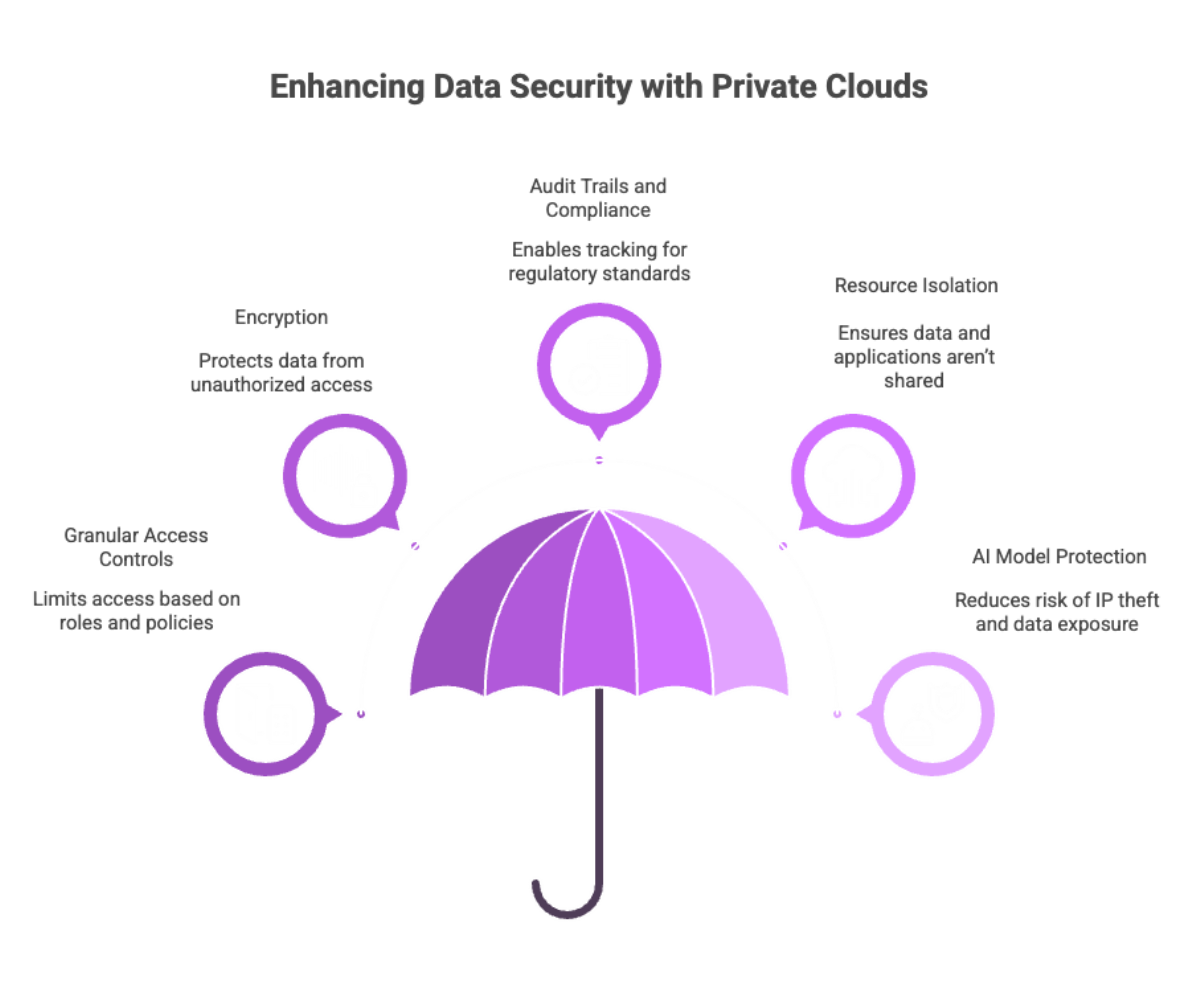

AI Workloads in Private Cloud
Deploying AI at scale requires robust infrastructure, high compute capacity, and secure data handling—areas where private clouds excel. Whether it’s training large AI models or running inference tasks in production, private clouds offer a powerful platform to manage end-to-end AI workloads.
Benefits of using private clouds for AI
-
Scalable GPU/TPU clusters tailored to AI processing needs
-
Low-latency networking to handle real-time data ingestion
-
Data sovereignty for sensitive or regulated data
-
Seamless integration with existing data centers and on-premise systems
Organizations can efficiently manage the lifecycle of AI—from data preparation and training to model deployment—while ensuring performance and security remain uncompromised.
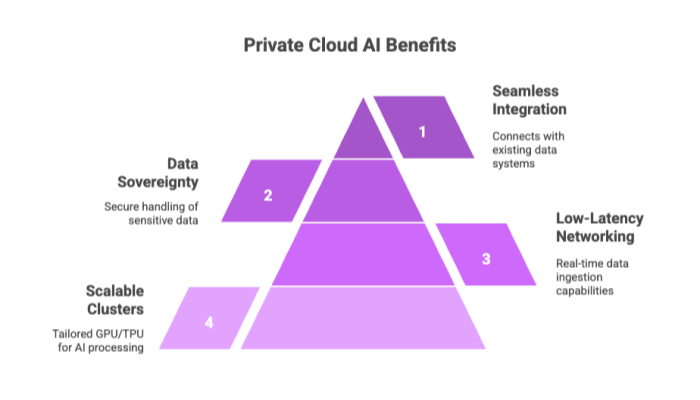

Private AI Solutions
Private AI represents a fusion of cloud-native flexibility with the customization and security of dedicated infrastructure. These solutions empower businesses to implement AI responsibly, on their own terms.
Key features of private AI solutions
-
Tailored AI frameworks and pipelines for niche applications
-
Custom deployment models, from on-premise to hybrid private cloud
-
Support for multiple AI algorithms, languages, and data sets
-
Integrated MLOps tools for version control, model monitoring, and compliance
Whether you're building predictive models for operations or developing AI agents for customer support, private AI gives you the confidence to innovate securely and efficiently.
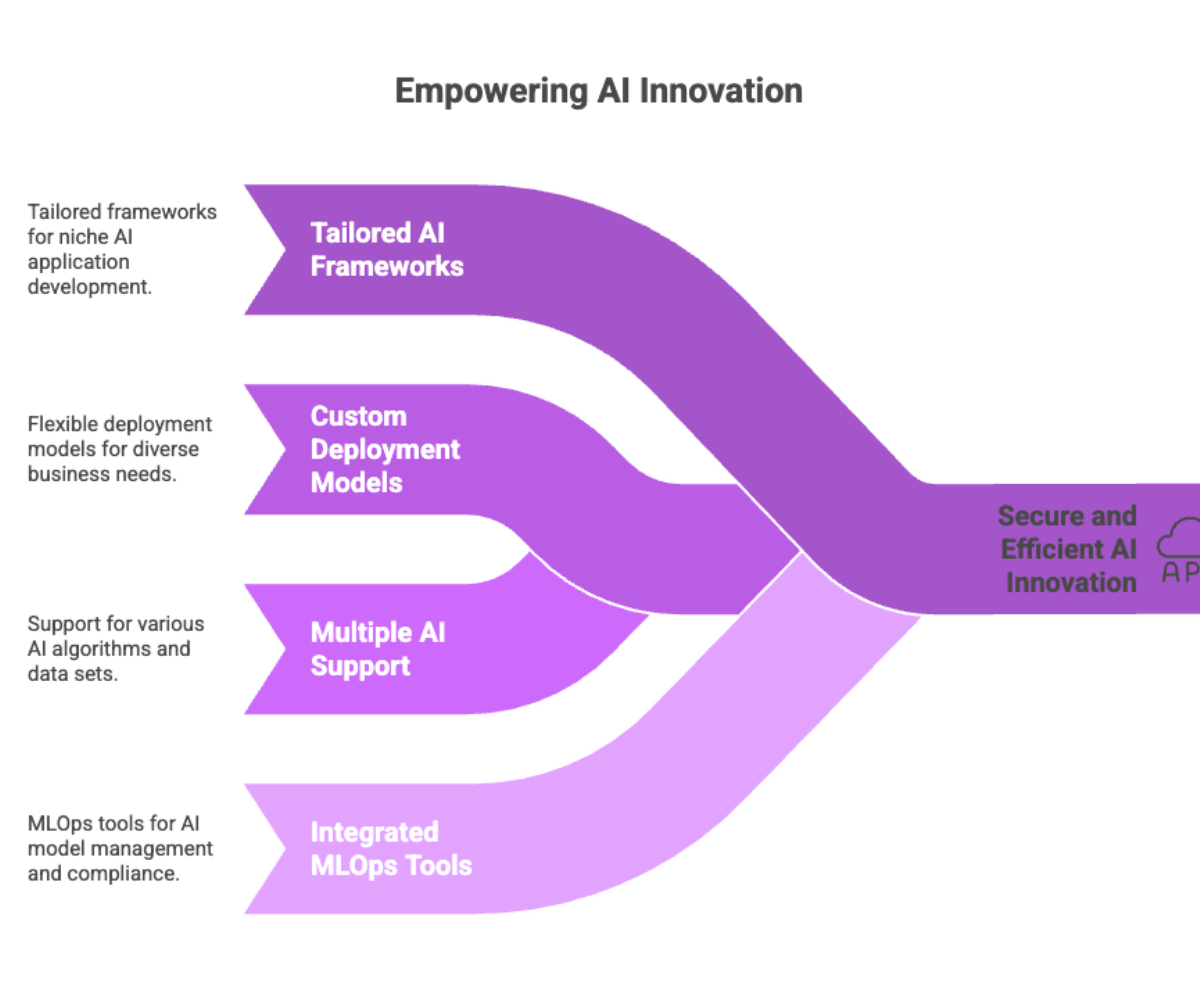

Private Cloud Solutions for Business
Beyond technical advantages, private cloud solutions serve strategic business goals. They enable digital transformation with a balance of agility and control—making them a core enabler of enterprise AI strategies.
Strategic benefits:
-
Cost control: Avoid variable pricing and resource sprawl common in public cloud.
-
Compliance readiness: Designed with governance and auditability in mind.
-
Performance consistency: Predictable latency and I/O operations for mission-critical apps.
-
Vendor independence: Greater flexibility in toolsets, storage, and compute resources.
From customer experience improvement to predictive maintenance use cases, private clouds provide a high-impact foundation for tech-forward organizations.
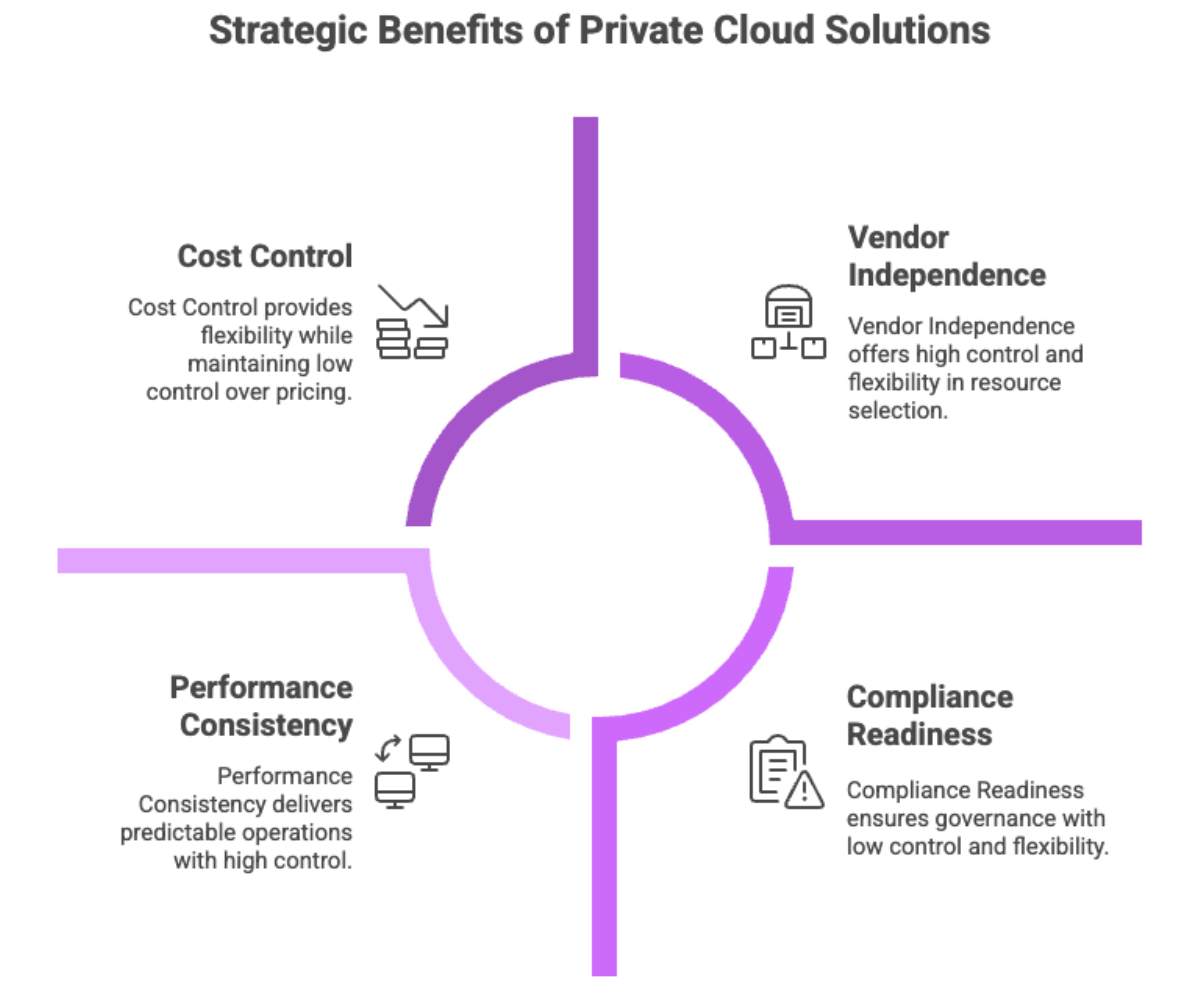

AI Strategy and Development
A clearly defined AI strategy is no longer optional—it’s a competitive necessity. But strategy must be supported by the right infrastructure. That’s where private clouds enter the equation.
Steps to align AI and cloud strategies:
-
Assess business needs and AI readiness: Identify key use cases and maturity level.
-
Define data governance policies: Align with privacy, legal, and ethical standards.
-
Architect AI workflows: Map out everything from ingestion to model deployment.
-
Choose the right infrastructure: Evaluate private cloud offerings for compatibility and scalability.
Private clouds allow enterprises to control not just how AI is built—but also how it's governed, scaled, and optimized for business goals.
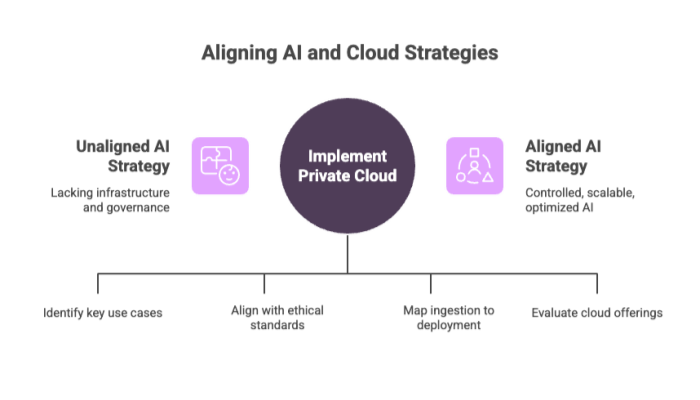

AI Models and Development in the Private Cloud
Whether you're training generative AI systems or implementing predictive analytics, the integrity of your AI models depends on secure, high-performance environments.
Why private clouds are ideal for AI model development?
-
Provide data isolation for proprietary and regulated datasets
-
Allow fine-tuned resource allocation during model training
-
Offer compatibility with popular frameworks (e.g., TensorFlow, PyTorch)
-
Enable faster iteration cycles through dedicated compute nodes
Moreover, with growing concerns around bias, fairness, and explainability in AI, private environments make it easier to implement responsible AI practices.
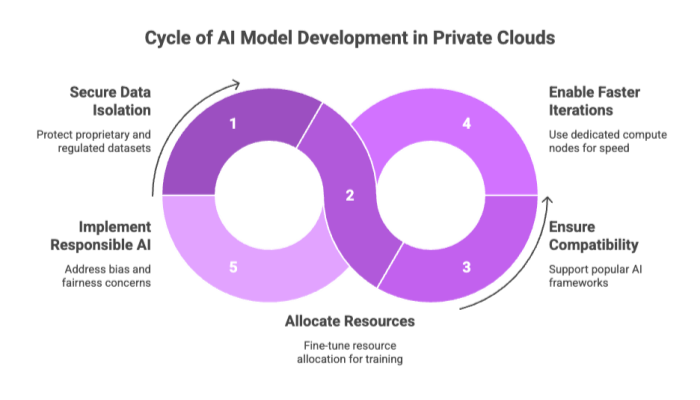

Conclusion
The convergence of private cloud infrastructure and AI development marks a transformative shift in how businesses operate, innovate, and compete. By choosing private cloud AI solutions, organizations can:
-
Protect intellectual property and sensitive data
-
Align AI efforts with strategic goals
-
Foster a secure environment for scalable AI workloads
-
Reduce cloud costs while increasing operational agility
As the future of AI becomes more regulated and security-focused, private clouds stand out as the clear path forward for secure, compliant, and innovative business solutions.

